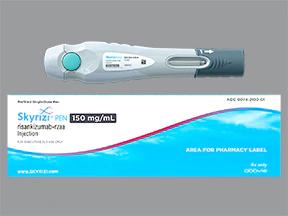
What is Risankizumab?
Risankizumab can be used by itself or in combination with other drugs to treat moderate-to-severe plaque psoriasis and active psoriatic arthritis in adults. Risankizumab can also be used to treat Crohn’s disease in adults. Risankizumab can be used in other ways not mentioned in this guide.
Side effects of Risankizumab
If you experience any of the following symptoms of an allergic reaction, seek immediate medical attention: difficulty breathing, swelling in your face, lips, or throat, or hives.
If any of the following symptoms arise, call your healthcare provider immediately:
- A sore throat, night sweats, and fever.
- Red or swollen gums and mouth sores are common.
- Pale skin, easy bruising, and unusual bleeding
- Chest discomfort; wheezing; dry hack; rapid weight gain
Call your doctor immediately if you:
- Nausea, vomiting, skin rash,
- Liver problems: loss of appetite, pain in the upper right corner of the stomach, tiredness, itchiness, dark urine, clay-colored stools, jaundice
You may need to delay taking further doses until the infection has cleared.
Some of the most common side effects associated with risankizumab include:
- Fever, headache, tiredness;
- Joint pain, back pain
- Cold symptoms including runny noses, sneezing fits and sore throats;
- Pain and burning when urinating;
- Fungal skin infection;
- Low red blood cells (anemia);
- Pain, redness or inflammation at the injection site
There may be additional side effects. For medical advice regarding side effects, reach out to your physician. The FDA can be contacted at 1-800-FDA-1088 to report side effects.
Warnings
If you experience flu symptoms such as coughing, night sweats, neck stiffness, or confusion, call your doctor. Your doctor will test you to see if you have tuberculosis or any other infection before you start using risankizumab.
Before you take this drug
If you have an allergy to risankizumab, it is best not to use it. Tell your doctor before you begin using risankizumab if you experience any symptoms of infection, such as fevers, chills, and coughs; body aches or tiredness; sores or wounds on the skin; diarrhea; stomach pains; weight loss; or painful urination. Tell your doctor about any recent travel or exposure to tuberculosis. You may have come into contact with certain infections while traveling.
Tell your doctor if:
- An active or chronic infection
- Tuberculosis, or if someone in your family has it,
- You have recently received or will soon receive any vaccine.
- Liver disease.
Before you begin using risankizumab, make sure that you have received all of your vaccines. Risankizumab is not known to harm unborn babies.Inform your doctor immediately if you are expecting or planning on becoming pregnant. You may find your name on a registry for pregnant women to track the effects risankizumab has on the child. Ask your doctor if you can safely breastfeed while taking risankizumab.
How to take Risankizumab?
Please read and heed all instructions included with your medication, such as guides or labels that come with it. Follow the directions on the label. In some cases, risankizumab can be injected by a healthcare professional over the course of an hour. The first three infusions usually occur four weeks apart. The treatment is continued with a dose of the drug under the skin every eight weeks, using an injector placed on the body. Risankizumab can also be injected into the skin using a prefilled syringe, pen, or If you're not sure how to inject an injection, ask your pharmacist or doctor. Only prepare an injection when it is time to use it. If the medicine is cloudy or has changed color, call your pharmacist. Never reuse a syringe or needle. Put them in a "sharps container" that is puncture-proof, and dispose of the sharps according to local or state laws. Keep away from children and pets. Your healthcare provider can show you how to inject risankizumab. Don't inject the same area twice in a short period of time. Avoid injecting into hard, irritated, swollen, or tender skin, or any skin affected by psoriasis. Do not inject your product within two inches of the navel. You could get infected more easily. This includes serious infections that can be fatal. You'll need to undergo frequent medical tests. Your doctor will test you for tuberculosis and other infections before you start using risankizumab. Your liver will require frequent blood tests. Keep the original packaging in the refrigerator. Do not expose yourself to light, and don't shake or freeze. Follow the instructions and let the medicine reach room temperature. Warm the medicine using hot water, sunlight, or a microwave. After one use, throw away any risankizumab, whether it is damaged, frozen, or dropped.
Details on dosage
Usual Adult Dose for Plaque Psoriasis:
Subcutaneous injection of 150 mg (two 75mg injections) at Week 0, Week 4, then every 12 weeks thereafter
Comments:
Assess the patient for tuberculosis infection (TB) before initiating this medication.
Use: To treat moderate-to-severe plaque psoriasis among adults who are eligible for systemic therapy.
What happens if I miss the dose?
You are unlikely to miss a risankizumab dose in a medical setting. Use the medicine immediately after you remember it. Then, return to your normal schedule. Never take two doses of the same medication at once.
What happens if I overdose?
Contact 1-800-222-1222 immediately in case of poison exposure and seek emergency medical attention immediately.
What should be avoided?
You could get a serious infection if you receive a "live vaccine". Live vaccines are measles (MMR), rubella, rotavirus (typhoid), yellow fever, varicella, chickenpox, and zoster.
Interaction with other drug
Other medications, such as prescription and over-the-counter medicines, vitamins, and herbal products, may also affect risankizumab. Inform your doctor of all the other medications you take.



